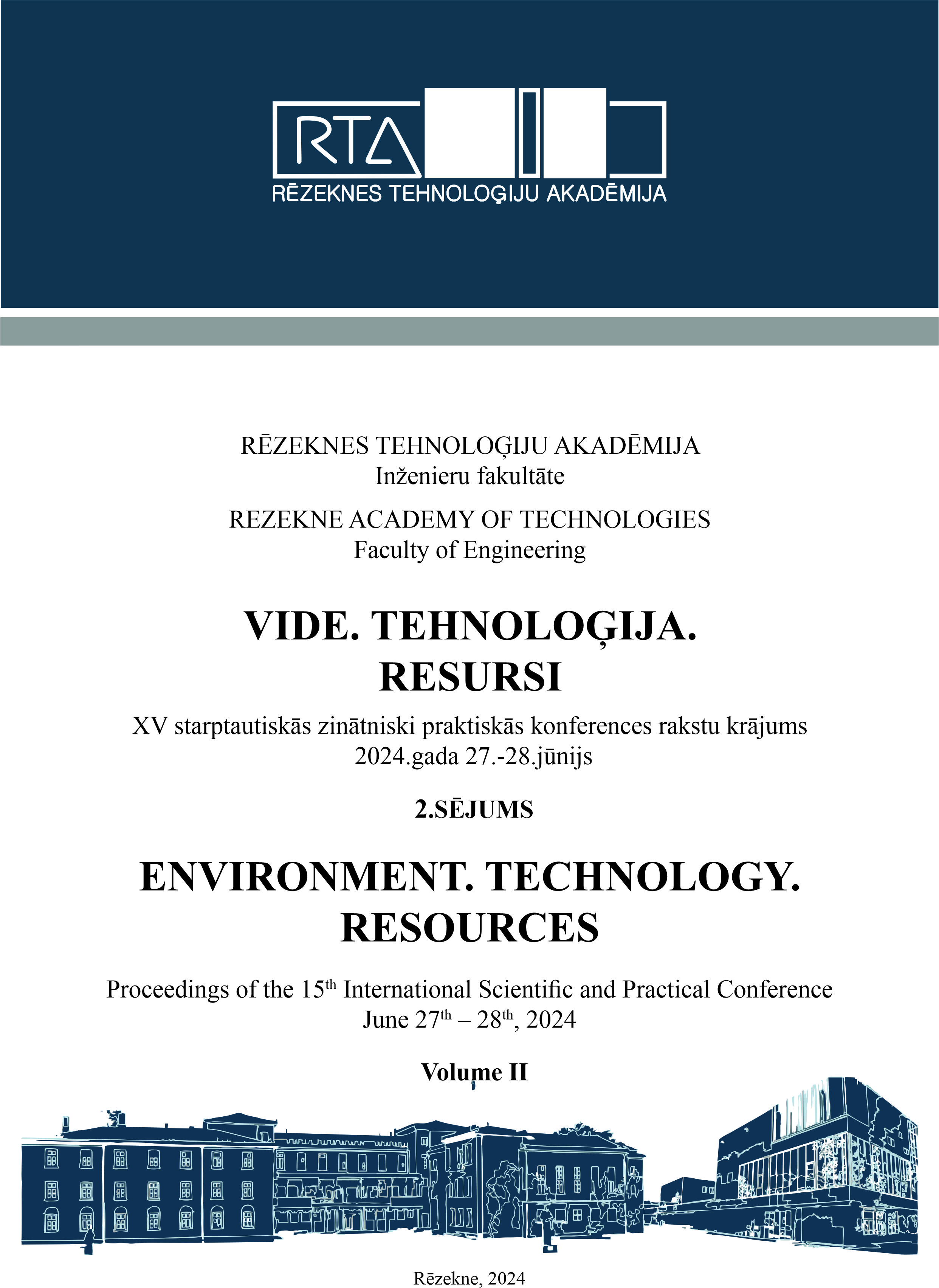MULTIMEDIA TECHNOLOGIES AS TOOLS FOR FOSTERING DIGITAL LITERACY IN EDUCATION
DOI:
https://doi.org/10.17770/etr2024vol2.8077Keywords:
digital literacy, multimedia technologies, physical educationAbstract
This study explores the integration of multimedia technologies into the educational landscape of physical education in Ukraine, considering various forms of education such as face-to-face, mixed, and distance learning, especially under martial law.
The purpose of the study is to reveal the attitude of physical education teachers towards the use of MT during physical education, to determine the level of digital literacy of physical education specialists and to outline the ways to improve it.
Methodology involves analysis and synthesis of literary sources, surveys conducted among physical education teachers using Google Forms, mathematical data processing, and a pedagogical experiment. Survey results underscore the necessity of integrating multimedia technologies into physical education, with most teachers acknowledging their positive impact on teaching quality but expressing a need for enhanced digital skills. The observed digital literacy level aligns with the basic standard, prompting the development of a program utilizing multimedia technologies to shape the digital literacy of physical education teachers.
Digital literacy evaluation employs the Digital Competence Framework for Citizens rooted in UNESCO documents, categorizing competence levels as basic, independent, and professional. The resultant program for nurturing digital literacy among physical education teachers comprises theoretical-organizational, operational, methodical, and assessment components. Experimental testing confirms the program’s efficacy, revealing an improvement in digital literacy from basic to independent user levels and, in some cases, professional competence.
In conclusion, this research highlights the positive impact of the program on enhancing the knowledge, skills, and professional aptitude of physical education teachers, poised to improve the effectiveness of physical education in Ukraine and address contemporary educational challenges. Furthermore, the program serves as a foundational framework for advancing multimedia support in the field.
References
I. P. Vorotnikova, "Conditions for the formation of a teacher's digital competence in postgraduate education, " in Open educational e-environment of modern University, Vol. 6, 2019, pp. 101-118.
N. V. Morse and I. P. Vorotnikova, "ICT model of teachers' competence, " in ScienceRise: Pedagogical Education, Vol. 10 (6), 2016, pp. 4-9.
O. V. Ovcharuk, "The Digital Competence Framework for Citizens: A European Strategy for Determining the Level of Digital Competence, " in Pedagogy and psychology. Bulletin of the National Academy of Pedagogical Sciences of Ukraine, Vol. 1(98), 2018, pp. 31-38.
N. S. Sorokolit, "Methodical methods of formation of informational and communicative competence of students by means of physical education, " in Actual issues of physical culture, sports and ergometry: coll. theses III International science and sport cong. Chernivtsi National University named after Yu. Fedkovicha, Chernivtsi, 2019, pp. 36–38.
N. S. Sorokolit, "Ways of implementing mathematical and informational and communicative competences in physical education of schoolchildren, " in Innovative pedagogy, Vol. 44(3), 2022, pp. 54-57. DOI: https://doi.org/10.32843/2663- 6085/2022/44/3.11
DigComp 2.1: The Digital Competence Framework for Citizens, Update Phase 1: the Conceptual Reference Model, Luxembourg: Publications Office of the European Union, 2017. DOI:10.2760/38842. [Online]. Available: http://publications.jrc.ec.europa.eu/repository/bitstream/JRC106281/web-digcomp2.1pdf_(online).pdf [Accessed: Aug. 18, 2023].
M. Kelentrić, K. Helland and A. T. Arstorp, "Professional Digital Competence Framework for Teachers in Norway, " [Online]. Available: https://www.udir.no/in-english/professional-digital-competence-framework-for-teacher [Accessed: 13 Apr. 2023].
S. Kluzer, L. P. Priego, DigComp into action: Get inspired, make it happen. A user guide to the European Digital Competence Framework. Joint Research Centre (Seville site), 2018. DOI : 10.2760/112945
R. J. Krumsvik, "Teacher educators' digital competence, " in Scandinavian Journal of Educational Research, Vol. 58(3), 2014, pp. 269-280.
O. Mcgarr, and A. Mcdonagh, "Digital Competence in Teacher Education, " [Online]. Available: https://www.researchgate.net/publication/331487411_Digital_Competence_in_Teacher_Education [Accessed: 13 Nov. 2023].
Fanny Pettersson, "Digitally Competent School Organizations-Developing Supportive Organizational Infrastructures, " Vol. 14, 2018, pp.132-143.
L. Starkey, "A review of research exploring teacher preparation for the digital age, " in Cambridge Journal of Education, Vol. 50(1), 2020, pp. 37-56.
J.Tondeur, K. Aesaert, B. Pynoo, N. Fraeyman and O. Erstad, "Developing a validated instrument to measure preservice teachers’ ICT competencies: Meeting the demands of the 21st century, " in British Journal of Educational Technology, 2016. DOI : https://doi.org/10.1111/bjet.12380
R. Vuorikari, Y. Punie, Gomez S. Carretero and G. Van den Brande, "DigComp 2.0: The Digital Competence Framework for Citizens. Update Phase 1: The Conceptual Reference Model, " in Luxembourg Publication Office of the European Union, 2016. DOI: 10.2791/11517.
O. Wohlfart, M. Mödinger and I. Wagner, "Information and communication technologies in physical education: Exploring the association between role modeling and digital literacy, " in European Physical Education Review, 2023. DOI : https://doi.org/10.1177/1356336X231193556
Three Ukrainian sports startups received a free one-year membership subscription to The Global Sports Innovation Center powered by Microsoft. Ministry of Youth and Sports of Ukraine. [Online]. Available: URL:https://mms.gov.ua/news/try-ukrainski-sportyvni-startapy-otrymaly-bezkoshtovno-richnu-pidpysku-na-chlenstvo-uorhanizatsii-the-global-sports-innovation-center-powered-by-microsoft-gsic. [Accessed: Nov. 22, 2023].
N. Grabyk and I. Hrubyk, "The modern educational space requires a pedagogical worker to master the latest approaches based on digital technologies, to create and operate a proper high-tech and high-quality information and educational environment. Digital technologies in the training of physical education teachers, " in Modern digital technologies and innovative teaching methods: experience, trends, " in prospects: IX International science-practice Internet Conf. (Ternopil, April 28, 2022). Ternopil: TNPU named after V. Hnatyuka, 2022, рр. 87–90.
Downloads
Published
Issue
Section
License
Copyright (c) 2024 Nataliia Sorokolit, Olha Rymar, Ivanna Bodnar, Olena Khanikiants, Alla Solovey

This work is licensed under a Creative Commons Attribution 4.0 International License.



